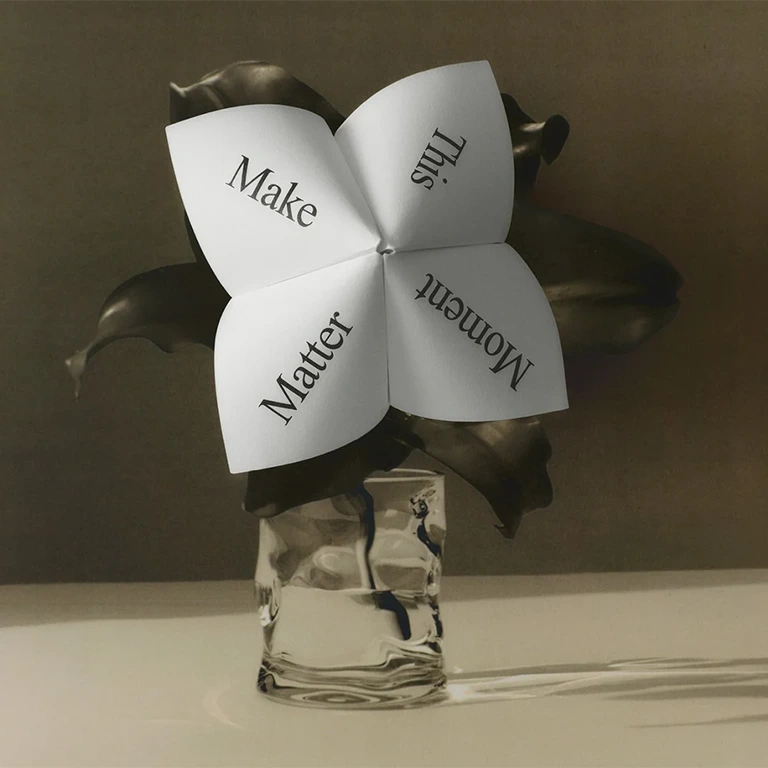Good Design
Learn from our COMMON GROUND speakers as they reflect on “Good Design.”
Whether it's an elegant piece of furniture, or a well-conceived public space, good design leaves a lasting impression that can lead to positive outcomes. How can good design resonate deeply with people? How can we understand and empathise with the needs, desires, and challenges of the intended audience? How can we keep alive artisan skills that date back centuries in the face of our mass–produced, disposable design culture? And how can we educate consumers to understand the cost to the planet of the chair they sit in?
During the COMMON GROUND Symposium held at our festival this past summer, our design community offered a thought-provoking exploration into the multifaceted concept of good design, unpacking its meaning, and potential for catalysing positive change.
In the session, “Good Design,” we were joined by prolific designers Luca Nichetto, Michael Anastassiades, Alfredo Häberli and Akanksha Deo Sharma.
Exploring 'Good' Design
'Good design' means different things to different people based on their cultural backgrounds, and personal views. However, by exploring design's potential impact, we can identify common principles that help define good design, such as sustainability, accessibility, and inclusivity. When combined, the result is effective design that can improve our lives and drive change.
The question is, how can we support designers to questions convention and address important social, environmental, and economic challenges both locally and globally?
Curious and excited by the innovations emerging from developing nations, Deo Sharma believes that inclusive and impactful design can be redefined with community focus and creativity driven by necessity.
“Design is a tool for equity, empowering diverse communities to create resilient solutions that address real challenges, from climate resilience to economic inclusion. By bringing all voices to the table—especially those from marginalised regions—we not only solve local issues but pioneer ethical, transformative structures for a more just global future.” — Akanksha Deo Sharma

Anastassiades has always challenged conventions, in a career that began by creating designs that raised more questions than they answered:
“We are channelled to think fast turnaround, fast income - we must not be afraid to raise questions and question our role as designers in today’s environment, which is much harder for designers to operate in than it used to be. If we want to leave the world in a better place than we found it, we need to revise the current system, which devalues design for marketing stunts, social media and an unsustainable economic landscape.“ — Michael Anastassiades
Key for Häberli is the idea of educating consumers on the potential impact of design, as part of the need he sees to be more honest and transparent:
“It is not enough that we as designers understand the process. We need to educate users, brands and buyers on production, materials, and so forth. We need them to understand the cost to the planet of the chair they sit in, the light they read in, and the spaces they visit. We cannot create less designs, designs with longevity, if the audience doesn’t know and understand what it requires today to manufacture sustainable and responsible designs.” — Alfredo Häberli
Focusing on the important role of the artisans and craftsmanship in creating original, authentic designs in contrast to our throw-away culture, Nichetto emphasised:
“Mass production and the current financial focus on growth and profits are strangling our craftspeople along with the centuries old skills that has allowed us to create the long-lasting design objects we all love and cherish. We must protect and support these communities, or they will disappear. If we don’t, the result will be homogenous and uninspiring designs, which will only further encourage throw-away culture and quick profits.” — Luca Nichetto

Finding Common Ground
This session invited attendees to contemplate the essence of good design beyond mere aesthetics, emphasising its capacity to address complex challenges, and inspire meaningful action to share a more equitable and sustainable world. From the transformative potential of design to educating the industry and consumers at large, speakers shared stories and insights to redefine what good design can really mean.
Listen to Nichetto, Häberli and Anastassiades as they continue the conversation in our podcast.
Learn more about our speakers
Luca Nichetto
Originating from the renowned island of Murano outside of Venice, Luca Nichetto is an Italian industrial designer and founder of Nichetto Studio - a multidisciplinary studio with offices in Venice and Stockholm, specialised in art direction, industrial and product design, and architecture. The studio’s unique position within both Scandinavian and Italian design culture has led to worldwide acclaim that extends far beyond the confines of the design industry.
nichettostudio.com
Michael Anastassiades
The work of Cypriot-born, London-based designer Michael Anastassiades encompasses product design, spatial interventions and experimental concepts, often transcending the distinctions between different fields of creativity. With a career spanning more than 20 years, Anastassiades has conceived lights, furniture and objects characterised by a poetic yet rigorous interpretation of technology, materials and functions.
michaelanastassiades.com
Alfredo Häberli
Swiss-Argentinian designer Alfredo Häberli is an internationally-established designer based in Zurich, working for some of the leading companies within the global design industry. In his designs, Häberli succeeds in uniting tradition with innovation, imbued with joy and energy. His work is strongly influenced by his early childhood in Argentina, as well as his curiosity, and observations of everyday life. The results are works with a strong expression and emotionality.
alfredo-haeberli.com
Akanksha Deo Sharma
Indian industrial designer Akanksha Deo Sharma is a multidisciplinary talent who is also a textile innovator and visual artist. Her work combines India's rich heritage in textiles, handicrafts and construction techniques reflecting her desire to develop a creative outcome that’s clean, minimal and playful. In 2020, she was included in Forbes list of “Indians 30 Under 30.” Deo Sharma is currently working with IKEA Denmark.
ikea.com
COMMON GROUND Symposium was hosted by 3daysofdesign in collaboration with IKEA Denmark. Innovators, designers and thought-leaders explored ways sustainable design practices can be more inclusive, equitable and protective of the planet. Moderated by Veronica D’Souza, social entrepreneur and keynote speaker on design, impact and inclusivity, we organised four sessions spanning a variety of pertinent topics, such as social sustainability, ESGs, materials and what good design really means.
At 3daysofdesign, our commitment extends beyond showcasing the latest trends in interior design and furniture. We strive to facilitate meaningful discussions, debate, and actively contribute to pushing forward a more sustainable approach within the realm of interior design and furniture business. Join us in our mission to inspire positive change and promote a greener, more responsible future for the industry.




